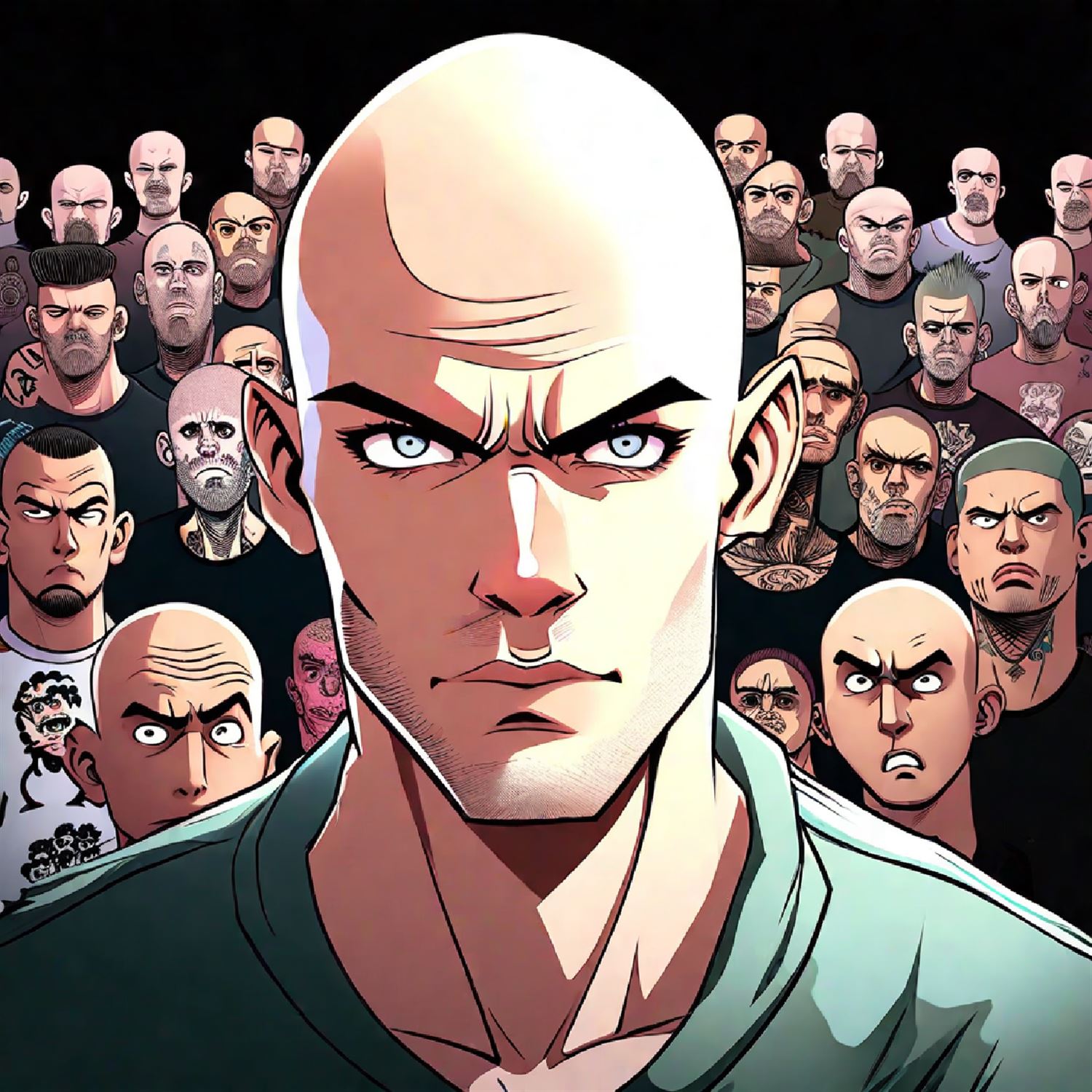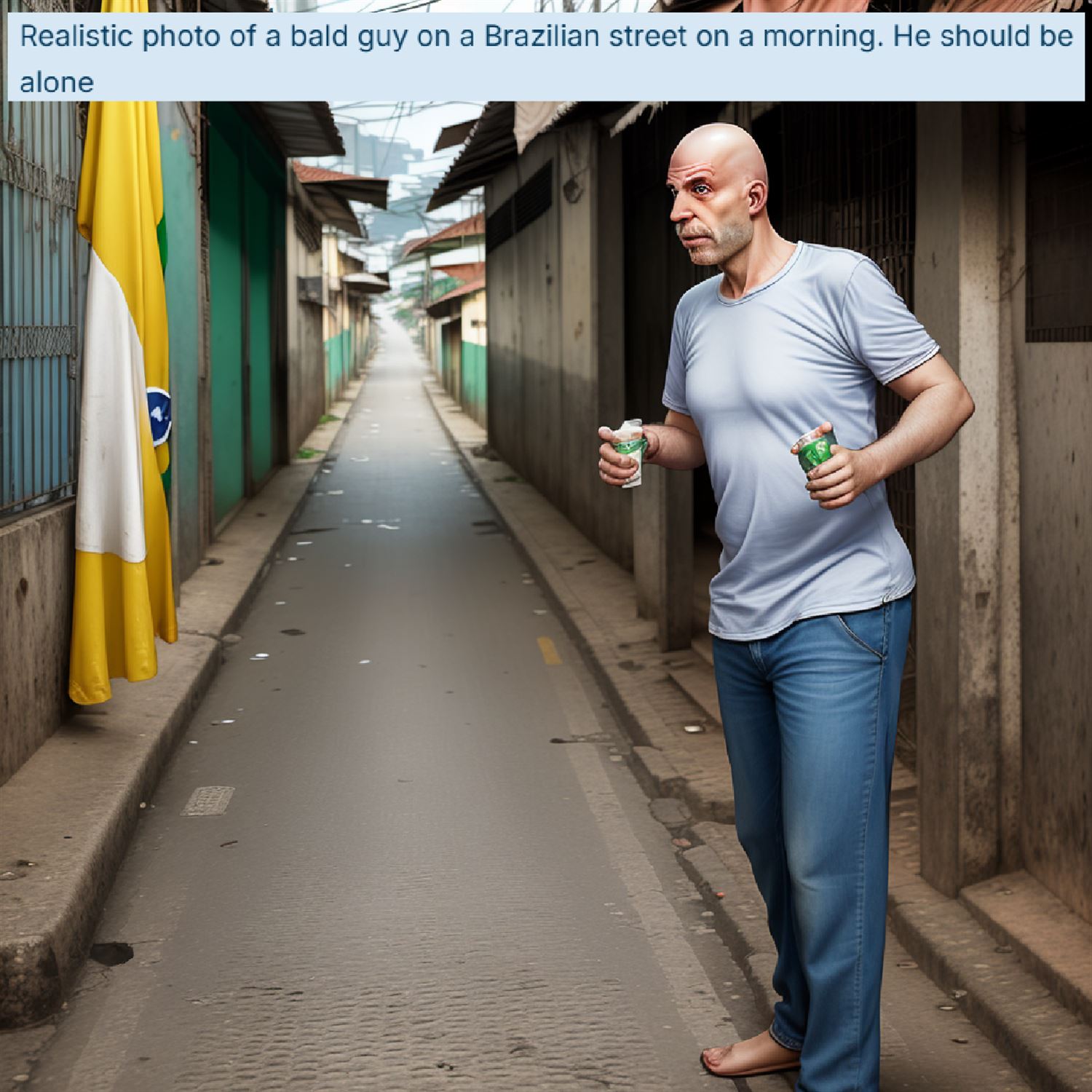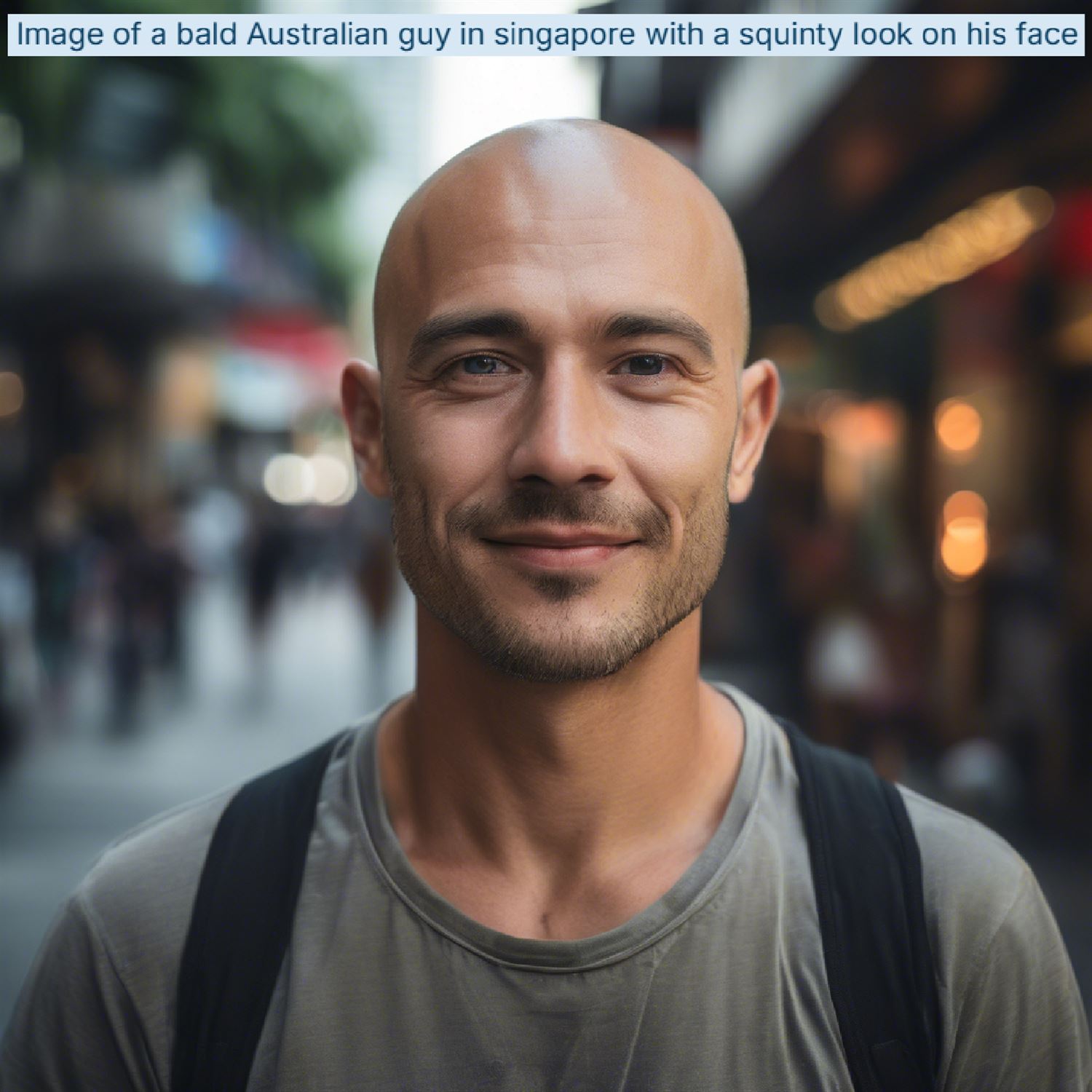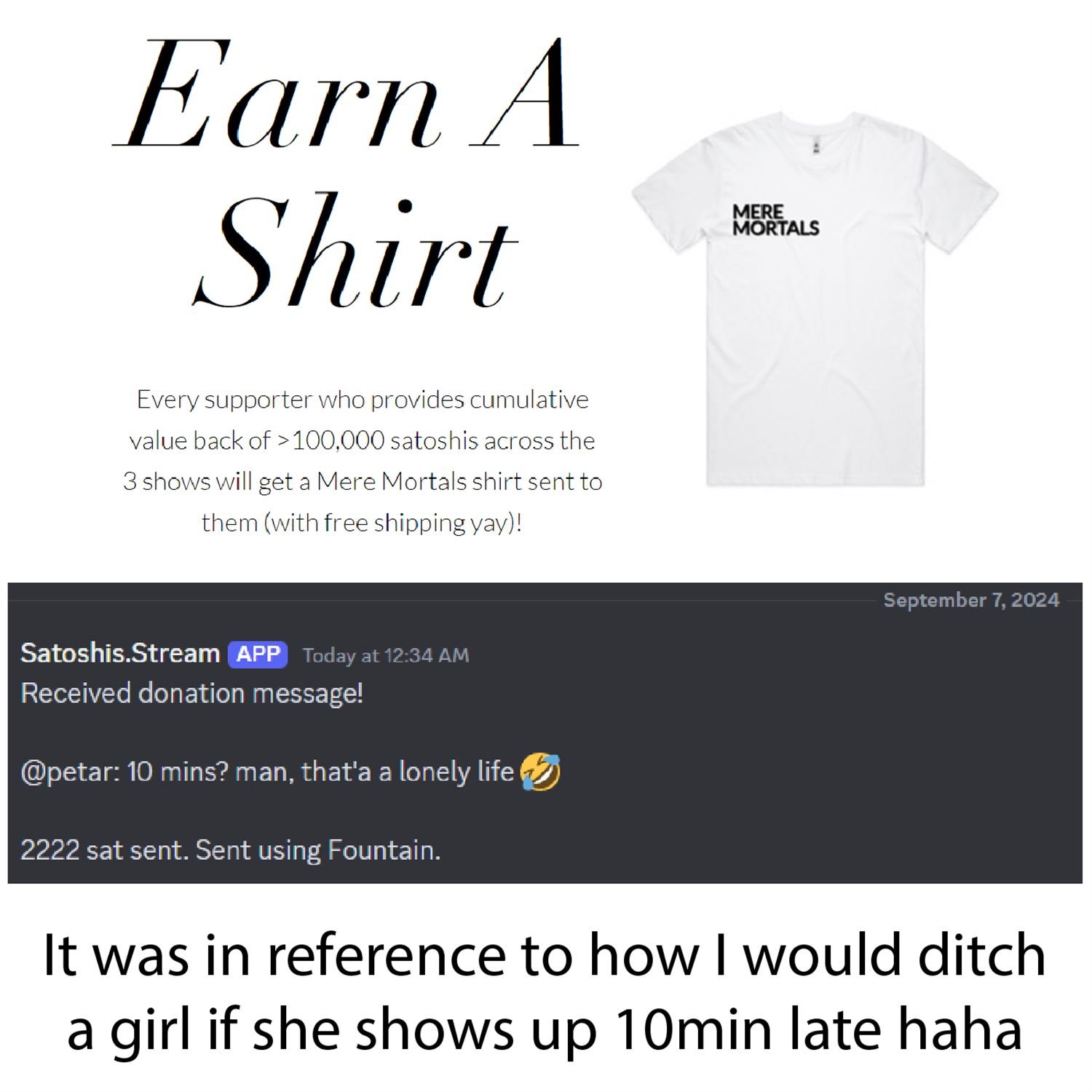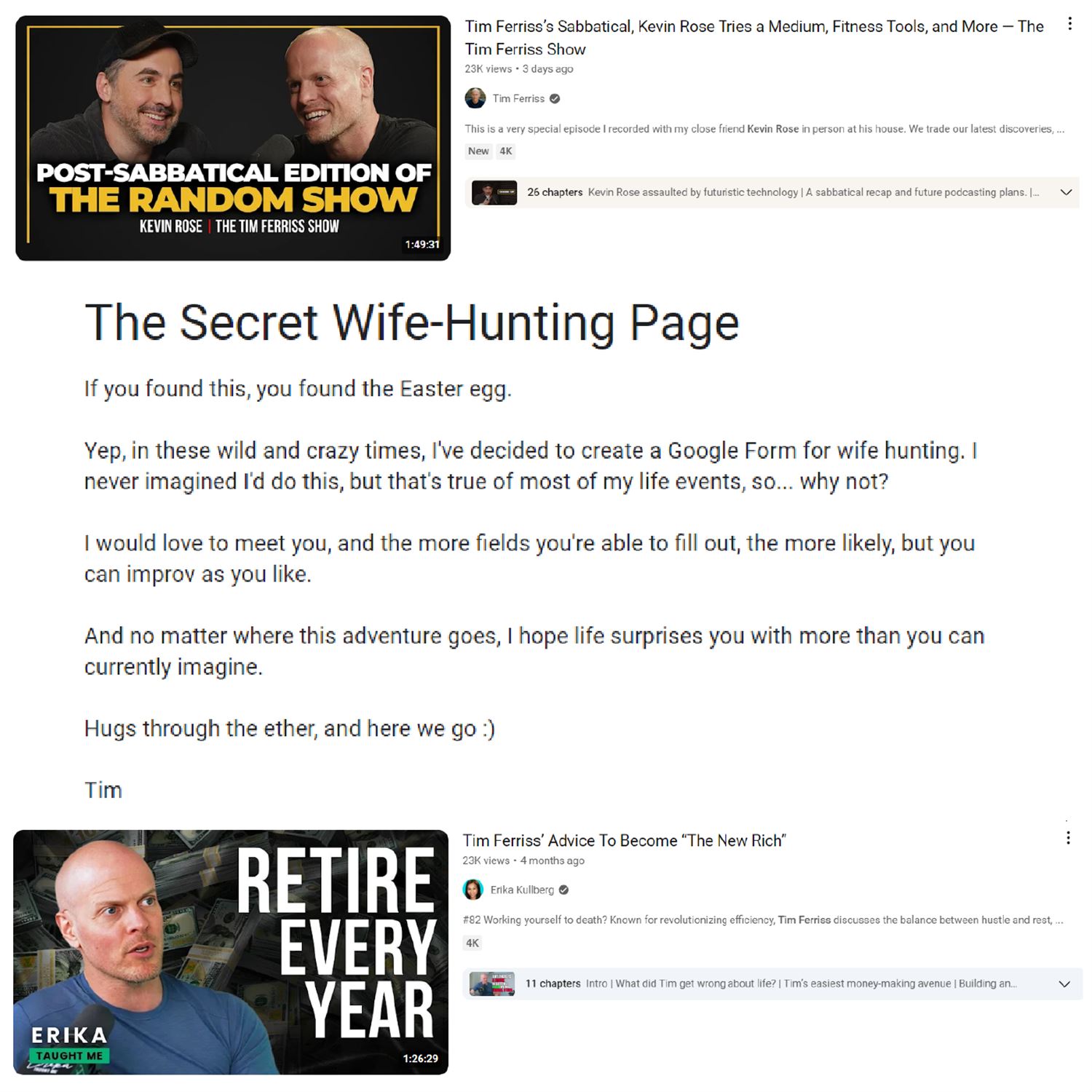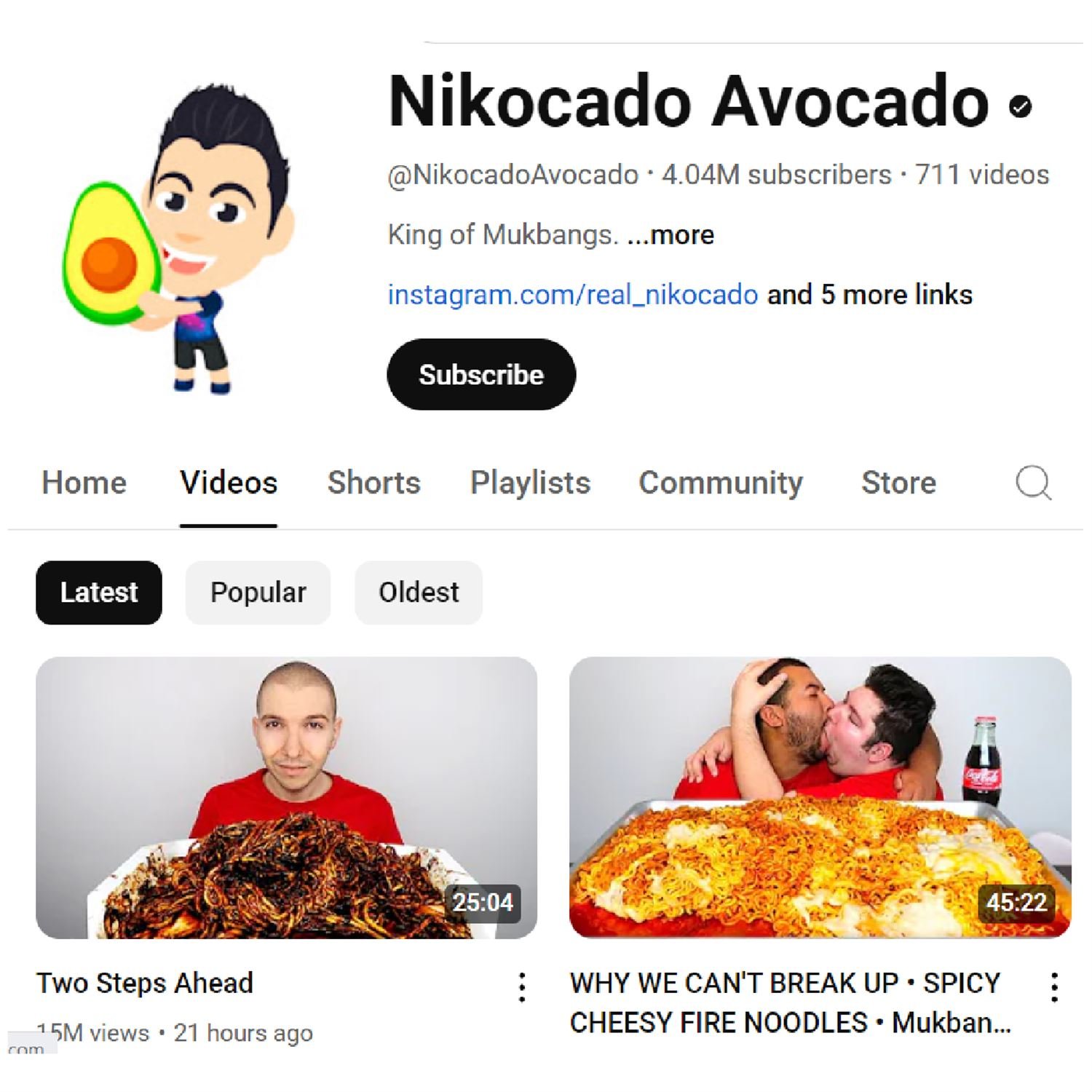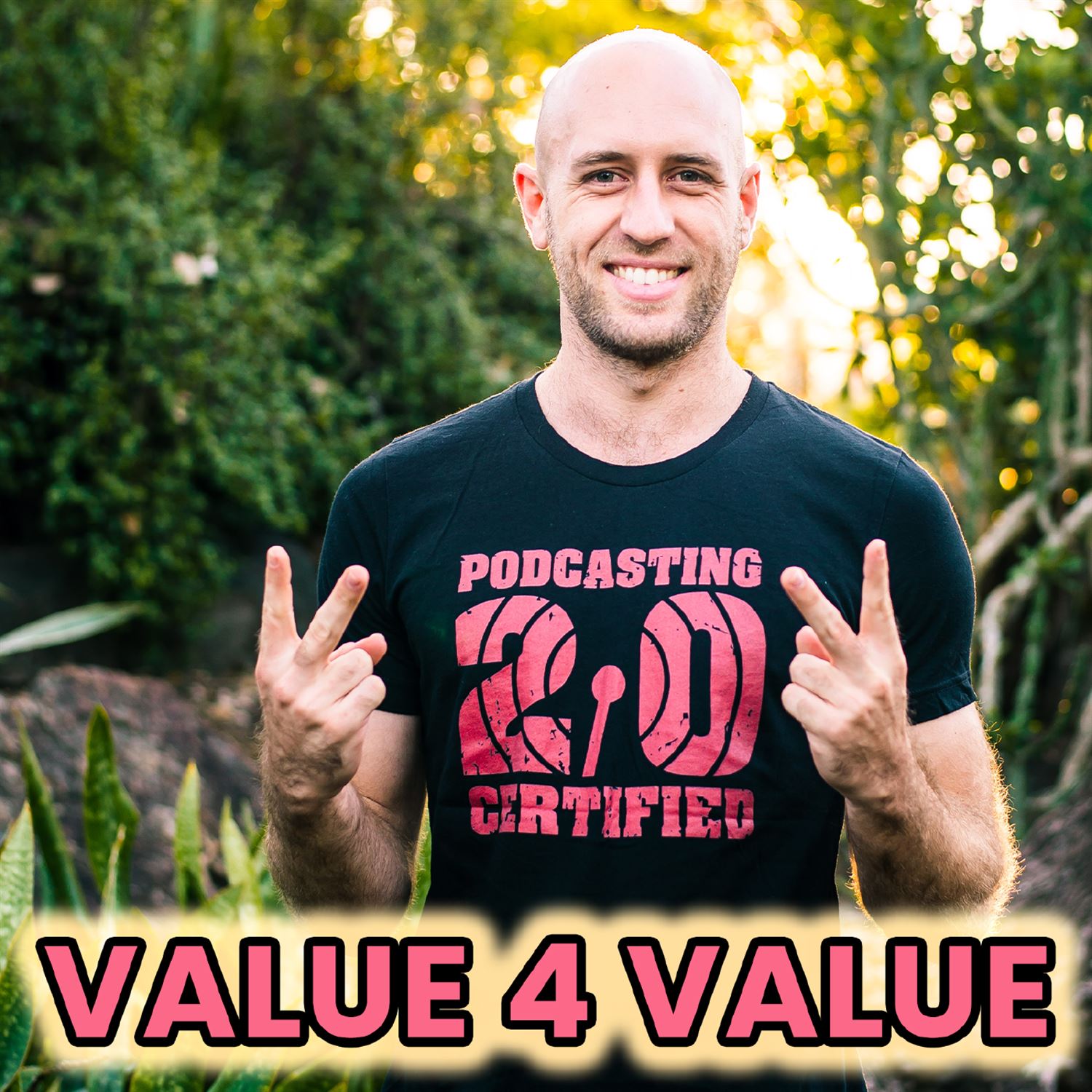Observations from the South American continent.
In Episode #456 of 'Meanderings' Juan & I discuss: four things you will never have heard about Brazil, why language barriers are tougher than cultural barriers, why conversational fluency isn't a high priority anymore, the return of Tim & his dating life, how Nikocado tricked everybody and podcast plans for the next few weeks.
Huge thanks to Petar the Slav for the support. We really appreciate you!
Timeline:
(00:00:00) Intro
(00:00:49) You've been clickbaited
(00:01:52) I am the danger!
(00:09:44) Soggy icecream
(00:14:07) What happens to Brazilians on a Sunday morning?
(00:16:39) Why did the chicken cross the Brazilian road?
(00:29:14) Moving to another country
(00:32:21) Changing language goals
(00:42:00) Boostagram Lounge
(00:44:58) Tim Ferriss & lacking adaptability
(00:56:28) Nikocado Avocado redemption
(01:01:42) V4V: Time/Talent/Treasure
Connect with Mere Mortals:
Website: https://www.meremortalspodcasts.com/
Discord: https://discord.gg/jjfq9eGReU
Twitter/X: https://twitter.com/meremortalspods
Instagram: https://www.instagram.com/meremortalspodcasts/
TikTok: https://www.tiktok.com/@meremortalspodcasts
Value 4 Value Support:
Boostagram: https://www.meremortalspodcasts.com/support
Paypal: https://www.paypal.com/paypalme/meremortalspodcast
Welcome, everyone to another episode of the Mere Mortals Meanderings. You've got Kyrin here in Brazil. And you have Juan over here in Australia. Brilliant. And we are recording here on the 7th September 2024. And a meanderings episode is where we just talk about little bits of pieces, funny stuff that's going on with life, perhaps random topics, because I'm travelling still at the moment, it's a bit hard to to really dial down into particular topics like we used to do with musings. So indeed, today, I've got I've got some funny ones on I've actually prepped quite a lot for this one. So I titled this episode, let me find the actual title that I gave it. Nobody tells you this about Brazil. I was trying to try to make it a little bit click baity as well.
So one if you had to guess, I've got 4 things here. What are the 4 things that no one tells you about Brazil? Oh,
[00:01:07] Juan Granados:
Well, see, I'll tell you what I think most often people think, right? It's beaches. It's really good looking girls walking around in bikinis.
[00:01:17] Kyrin Down:
Yep. Correct. The big food and the food thinking,
[00:01:24] Juan Granados:
some sort of robbery or something like that. So maybe things that they don't tell you is that not every girl is walking around in a bikini. There's a 9 out of 10.
[00:01:36] Kyrin Down:
All right. Well, you've it's like kind of kind of close with some of those, but I'll I'll jump right into them. So I'll start off all of these ones with a question. And then and then you you can try and answer it from there. So why did I not have a single incident of danger here? As in I've never really felt unsafe. I've never had anything bad to me. Why do you think the reason that is?
[00:02:04] Juan Granados:
Maybe because you haven't been out of the night that much?
[00:02:08] Kyrin Down:
Unknown: True. This is true. Part of it. But it's actually one because I am the danger. And so I've talked about this before. But the tattoo thing here is just out of this world. I thought, okay, I'll, I'll go away for a bit. I'll see America. You know, I'll I'll go to Canada, that'll kind of refresh me again. And then when I come back to Brazil, I'll probably be like, okay, they don't actually have that many tattoos. I was just, I'll just cherry picking or something. But no, the my my conviction is stronger than ever that Brazilians have the most tattoos I've ever seen. It is shocking how many that they are.
And the statistics I've seen online don't seem to capture this. And the reason that I think I am the danger is the tattoo equals bad boy equation, which when certainly when we were kids is what my dad used to tell me about be like, oh, you know, tattoos are for for like bikies and for like dangerous people and you know, for like lower class people, perhaps something like that. That equation as the first time I heard this theory of the inversion of this was from our mutual friend Joey, where he was saying no, it's actually now more socially kind of risque to to do the opposite. If you don't have a tattoo people like, oh, woah, like he's he's defying the the cultural norms and things.
So this has obviously been inverted here and my lack of ink signifies to people, like, watch the fuck out for this guy. He could be local key. He obviously does not fit in here. And he's, he's probably a bad boy. So I'm more hard than the souls of a street urchin in Rio favela. That's how hard I am. And just to like, bring this all together. Okay, here's a couple of stories. So I'm walking down the street, it's probably like, Thursday afternoon, 5 pm or something like that. You know, people are going to and fro from work stuff like this. And I see a girl coming down the street. And I would describe her as like, girl next door, white sundress, no makeup, bright eyed, straight hair, probably, like, about 20 years old.
And she is sporting a full fucking sleeve, man. Just a beast of an arm with, like, she's not strong or anything. You know? It's just her arm. She has a full sleeve on it. And it's, you know, how you can kind of tell when tattoos, like, a little bit different as well. There's some which are particularly, like, you know, tribal ones and some sort of so you you can kind of get a feel for, like, oh, okay. This is what this person's about a little bit. Well, her tattoo was just like, if I saw that on a guy in Australia, I'd be like, this dude's part of a bikey gang for sure. Like, this guy is gonna, he's gonna find one of those full on ones. Yeah, it was absurd, man. And just the contrast between everything about her and then seeing it's it was almost more jarring seeing her arm with a tattoo than if she just had no arm. Like if she just had no arm, I would probably find that more congruent.
But it was just absurd, man. I was in a restaurant. And I was looking around once. And from all of the the roughly 15 people I could see only 4 of them didn't have tattoos. And that was, you know, 4 who potentially could have 4 babies.
[00:05:36] Juan Granados:
4 babies. Yeah.
[00:05:38] Kyrin Down:
That was 4 who could have had tattoos and just you know, there were more under this under the clothes and stuff. Does it's dude just this like 2 days ago, he was running. I thought he was wearing stockings. But no, he just had like, leg tattoos that look like stockings. It is absurd, man. It is so crazy. I can't believe people don't talk about this more.
[00:06:02] Juan Granados:
Have you ever been anywhere where you've had has seen anything like that? Where or it's or it's like a No. I was just gonna running through my mind then what are the places I've been to that might might come close and, like, yeah, is mentioning nowhere. No. No way where it's the almost, like, overwhelming population has tattoos because you can single out, like, certain maybe places and individuals in Japan. There's, like, I've seen it a bit sometimes when I was in North America, the USA. But, yeah, not to what you're describing. We're basically every single person has a visible tattoo.
Is it is it a case, though, that, there's more skin showing in Brazil? So then you see the obvious tattoos?
[00:06:52] Kyrin Down:
No, I don't think so because that yeah. Okay. That, you know, they they were, long pants here sufficiently enough. The only thing I could kind of say is I hang where I exercise normally is near a kind of alternate bar. So, you know, I am going to get a bit of people coming to that and so walking to that and so then I'll see them. So if you're into, like, alternative lifestyle, you're probably more likely to have tattoos. But even then, it's just, you know, I see it on the streets. I see it in the shopping malls. I see it when I'm going out. It's it's just yeah, there is there is just a lot, man. There is a lot. So that that is why I I kind of guess that the that I'm so hard and have avoided danger so far.
[00:07:41] Juan Granados:
Well, absolutely. But yeah, I have never ever ever heard that. I'll apply. I guess I've never, like, inquired into it before. But even if you had to ask me like a general trivia question, what's the country that's most tattooed or in general? I don't know if Brazil would have come up at all. I would have actually thought it was the opposite.
[00:08:01] Kyrin Down:
Yeah. Yeah. The I I would have probably guessed maybe, like an island donation, perhaps, you know, Papua New Guinea or, Samoa or something like that. Or even one of the smaller ones, Tonga, maybe. But, yeah, just just a very strange cultural observation, which I just never heard of. So so that that was the first one. To understand
[00:08:25] Juan Granados:
this. By the way, a quick a quick Google of it as well. I don't know if I even believe this, but it says, as part of a tattoo statistic from disappeared ink, it actually says that the country with the highest percentage of tattooed people is Italy.
[00:08:41] Kyrin Down:
Oh, yeah. Okay.
[00:08:43] Juan Granados:
Which even that I'm like, what? I don't see that. I am one having daily but to again, it's kind of like, the culture that comes to my mind doesn't, I guess doesn't equate to lots of tattoos. But there you go. So maybe maybe that's what it is. You know, some of these places that we least expected plenty of tattoos, but they get cars are hot, a motherfucker in Brazil. That's number 1. I've actually think been thinking a lot of
[00:09:09] Kyrin Down:
those types of surveys when I think about it and I I go, how would I respond to a question? If I was to respond to one of these, I would probably take the question as literally as I could. And so it'd be like, have you ever had to had a tattoo and I'd maybe go, well, I had one of those fake tattoos once does that count? And then the then the person doing the thing would be like, you have to interpret it in your own way or something like that. So I'd probably just go yes. So this is this is why a lot of this self reported stuff as well. I'm I'm kind of skeptical on. So yeah, there we go. Right. 1, you should do well on this next one.
Because to understand this next cultural phenomena, we're gonna have to get out our chemistry textbooks. And one was actually pretty good at chemistry in high school thinking you might have got the best grades. So one, why do Brazilians have soggy ice cream?
[00:10:04] Juan Granados:
Why do Brazilians have soggy ice cream? Oh, do they not store it in the frick by lady fridge?
[00:10:15] Kyrin Down:
So they they store it in the fridge. They they do that. But the reason I believe that they have soggy ice cream is no one here from what I gather so far seems to really have a proper freezer. They seem to have these kind of fridges with a little compartment at the top which you open, which is slightly colder than the fridge, but it's not but not cold enough not cold enough. And so my my observation is that all their freezers are designed to hit the triple point of water. So here comes the chemistry. What what is the triple point of water 1?
[00:10:55] Juan Granados:
The triple point of water shit. Is it where the, like the point where just between, what are going to ice?
[00:11:04] Kyrin Down:
So it's it's where it can kind of exist as all all three states of of a of a thing. So between gas, solid and liquid, if you have got the pressure and temperature at the kind of right, right point, I guess is what you call it. So the triple point of water, do you know what temperature this is? Either in Kelvin or Celsius?
[00:11:31] Juan Granados:
Well, like 0 degree like slightly above 0 degrees? Yeah, there we go 0.01
[00:11:35] Kyrin Down:
degrees Celsius or 273.16 Kelvin. Yep. So my theory is that the reason they do this is they seem to like they like to have beers, like congealed beers. So where it's kind of, you know, it's like a slushy almost. So it's like a slushy type beer. So when they buy beers, they chuck up in these places. And sure enough, they become this kind of slushy drink. And, you know, you open it and it doesn't explode that sort of deal. And so I think they sacrifice their ice cream to be able to have congealed beers is essentially what I think.
[00:12:16] Juan Granados:
Right? So that what they're doing is they're prioritizing they're prioritizing the congealed slushy like beers for
[00:12:25] Kyrin Down:
sodium ice cream. Yeah. And so when you you put ice cream in the fridge in the freezer, it it's not it's already kind of melting by the time you get you know, you take a scoop out you put it on the on the bowl or the plate or whatever. And it's already starting to melt. Yeah. Yeah. So so this is a is a cultural phenomena I hadn't hadn't anticipated nor heard of before. Is it that good or that bad? Me personally, I don't think I would take the sacrifice for the beers or to have it like this to have to have my ice cream sacrificed. But I like an ice cream to be rock hard, not rock hard. But I like it when it's certainly harder than than what it is here. You know, maybe as hard as I am.
[00:13:12] Juan Granados:
That's that's how that's how hard I like it. So I I hate I hate sloppy ice cream, man. I hate when you scoop, like, when they ask for me that hasn't been in the freezer for long enough or get it out and it sits there for a little bit too long, slop it into your plate. It just becomes liquid, man. I hate that. Or even
[00:13:29] Kyrin Down:
even a kind of a scam, which is, I don't think many people would agree with, but I think is slightly scammy is ice cream on a hot day. You know, you get your ice cream cone, and it's just it's already melting by the time you you're starting to eat it. And you're instead of enjoying the ice cream, you're just doing clean up the whole time, just trying to make sure it doesn't run down your hands. So I think ice creams are best best taken in like winter, not winter, but in spring and in autumn. That's probably the best time for ice creams. Personally.
[00:14:05] Juan Granados:
That's good advice. Okay.
[00:14:08] Kyrin Down:
Another another question for you not one why what happens to Brazilians on a Sunday morning?
[00:14:19] Juan Granados:
What happens to Brazilians on a Sunday morning? I would have just defaulted to saying that they go to church. Okay.
[00:14:27] Kyrin Down:
This is what I thought as well. And this is partly the answer. But my my observation is that they, it's not that they go to church, it's that they do not exist. I'm like, they like Brazilians do not exist on a Sunday morning. So I've asked around because what what I've observed is, I'll go out on a Sunday morning. Everything opens up later, like all the shops and stuff will open at midday, for example. So no one's out shopping or anything like that. It's like, okay, alright, that's slightly different to Australia. You know, people are probably going to be shopping on a Sunday morning. I'll go out on the streets. I won't really see anyone there.
You barely see any cars around. And I just, I'm I'm not sure what people do. And I and every time I've asked someone, like, man, you must all go to to the, to church on Sunday morning or something. They're like, man, not really. You know? Some people do, but not that many. And I'm just like, well, where the fuck is everyone? Because I don't know where they are. Do they sleep in? Do they, you know, do they go for secret hikes? You know, they they're either some sort of Sunday vampire, you know, a vampire who only feels the effects on a Sunday, or all 212,000,000 have agreed to play a trick on the silly gringo and are laughing behind my back. Just on you. That's the only explanations are coming out. Because look, and I'm exaggerating. I do see some people, but it's significantly less than what you would see any other day. And I've yet to hear a good explanation from anyone on what the on what they're all actually doing on Sunday mornings. I just don't know.
[00:16:13] Juan Granados:
So yeah, but I mean, but I mean, there's a general consensus that I already have to assume is that everyone just sleeps in off on this.
[00:16:20] Kyrin Down:
But but they I've asked that as well. It's like, oh, so everyone sleep in. Do you stay in house? And they're like, no. No. No. Like, you know, we just we just do our normal stuff. I'm like, no, you don't. That's bullshit.
[00:16:30] Juan Granados:
No. You don't. I'm seeing you.
[00:16:34] Kyrin Down:
So anyway, that's that's one. There's Brazilians, Brazilian vampires all around us. My last one here is a joke. So why did the chicken cross the Brazilian road?
[00:16:52] Juan Granados:
I don't know why did it to join Schrodinger's cat.
[00:16:56] Kyrin Down:
So what happens here is when you step on a Brazilian road, you exist in the superposition of life and death, there is no you're you're neither alive nor dead when you step on a Brazilian road. Because zebra zebra crossings, for example, and this is this happens whether you're in the car or outside of the car on a bike or outside of a bike, even to some extent on any surface that looks semi road like. So I'll start with the zebra crossings. I think that they're kind of like, people have just painted black and white on the road to, you know, add to the metaphor of life and death. And they're more examples of like, this is maybe a nice place to cross the street, you're not going to get any protection like this does not these mean no rules.
And it's and it's not even like consistently, it would be okay. If it's like, zebra crossings don't mean anything. You know, here's just, here's just a place where you could cross the street. And every and you always just have to wait. But it's like half of the time half of the time a car will stop for you. And then half of the time it won't.
[00:18:10] Kyrin Down:
So
[00:18:10] Juan Granados:
So you can't even you can't even predictably say that, oh, yes. At this location, I can do this because the Yeah. Yeah. It's it's not you're seeing is like, at some point, yeah, they're gonna beep at you because you're not going and then the other time you're gonna go and then you're gonna be flattened on the pavement. Yeah, it's not based on location. And you'll see this as well where
[00:18:31] Kyrin Down:
there'll be I've had it once where so there's this, how many lanes is it? It's a 3 lane 3 lane road on each side where I have to cross. Now one side it's it's backed up by the traffic lights and so I can always cross there because, you know, the the cars get 3 deep and then and then they leave a little bit of space for the for the crossing so you can get across there fine. The other side of the road is where cars are entering into it from this kind of roundabout slash, they combine roundabouts here with with traffic lights. Once again, this is kind of like a weird unique Brazilian thing, much like their merging system, which I've talked about before.
And in this one, you'll get 3 cars all coming off this roundabout all at this one time on this pedestrian crossing. So it's like, okay, well, I'm just gonna wait. But what will generally happen is 1 or 2 of the cars will will slow down noticeably put on their traffic light. Yeah, traffic lights, the hazard lights, and come to a stop. So it's like, okay, they're obviously letting me through. And then the other lane will just continue continue to, like, keep going. So I'm now the jackass because I'm not crossing the road when people are waiting for me because I don't want to die.
But they're also like getting visibly annoyed because they stopped for me and I'm not crossing the road. And so then they go and it's like, well, what the fuck do you want me to do? So this happens all the time. Middle of the street is a VA is a valid parking spot, you are allowed to park in the middle of the street. I have seen this way too many times, particularly Uber drivers. And then probably like the just the most random one. So yesterday, I went for a walk by the by the lake. And you know, it's got kind of this like dirt, dirt road enough to fit like a car and a half on it.
All the way along this this lake, and it's very obvious, you know, only meant for pedestrians. Yet, you will continually encounter like police, particularly police, but sometimes maintenance crews as well, just randomly coming along in a car. And it just reminds me of like, man, Brazil, how it's good thing that I don't have any like, too many crazy Muslim people here who are like, you know, plowing into people like that person did in Nice. I think it was in 2016. Because man, there's just so many times where cars are mixing with pedestrians, on what should just be pedestrian kind of only turf. And it's, it freaks me out, man, honestly, like, I'm, I kind of keep a lookout just for cars, even on places where you shouldn't expect them because it's all it just takes us for someone to not look and then like, slow crush to death or something because they didn't see you or whatever. Yeah, well, it's all well, it's almost like
[00:21:34] Juan Granados:
in an inverse way, it's almost expected for you to see cars in an unusual location or for them to appear in unusual location. So I mean, for most people who are listening to the podcast as well, you know, we generally from places like Australia or America. And so maybe your expectation is is cargoes on road continues moving, and humans and individuals are on the on the pedestrian crossing and stuff like that nicely, safe safely on the pedestrian side as well. But, like, I can attest I've I've been to other hunters as well, which defies the laws of what a car and a human is. And since we blended together, you can assume you're both kind of able to do whatever the hell you wanna do, which would be scary, especially especially if someone who has only ever interacted with, you know, one country specific laws of how to move around. This was another reason, next year, I'm planning to drive a lot in Italy.
And a lot of the feedback and things I hear is, oh, yeah. Be prepared for it to be chaos. Everyone's beeping. You know, everyone's driving like maniacs. I've heard this. And kind of similar to what you're saying, mate. I'm I'm a little bit like, it's very I feel like it's coming from a very hey. I've only ever driven in Australia or in America before, something like that, where it's probably more usual. The driving is like what you're describing. Right? Where, well, it looks like, you know, Peter over here just started to park in the middle of an 80 kilometers. I know that's cool. I'll just let's go around them and try to avoid this human trying to go across the pedestrian crossing. So I feel like that's more I I would always say that's more of the normal across the world than the standard, driving that we may see. Mhmm. But in in any case, you have to kind of just become acutely aware of what's going on around the road.
[00:23:24] Kyrin Down:
I think each country has its own flavor to the driving as well, because I would actually say in general, I'm I'm rather impressed with Brazilian driving the the randomness of the roads, the merging, I find the the architecture of it for me screams that you're going to have car accidents all the time here. It just screams to me, this is poorly designed, people are gonna get hurt. But I've found that they they seem to merge pretty well with each other. They seem to anticipate people will go and weave in and out of lanes in a certain respect. You know, bike riders do not respect red lights, they just go straight through them if they feel like it.
Yet. The it there seems to be a bit more. Dare I say safety in all of it. I actually feel even though I exist in this super super position between life and death, I don't necessarily feel unsafe. In another contrast, when I was in Canada, when I was on the roads there, everyone was following the, you know, the rules to the letter. They weren't swerving in outer lanes, on kind of just rural pedestrian areas, suburban areas, things like that. Car parking car lots, everyone, you know, Peter in his car lot, to get into it, there was this random stop sign. Absolutely unneeded.
There's there's no it's on private property, you he was telling me you can't even have you don't have to obey the laws on private property for car car signage and things like that you can you can do what you want. Yet everyone would stop at this stop sign. But when they got on to the highway, man, those people were jackasses Canadians on highways were fucking terrifying. Because that was when you would see pretty consistently a dude doing 40 ks's an hour more than everyone else. Zigzagging in and out of traffic. And it was just consistent. Every time we went on the highway, I saw at least one person doing that.
So I think there's and you know, if I compare Brazilian driving to Colombian men, Brazil, Brazil's basically like Australia. You know, the Colombian driving is awful. It's terrible. If I compare Colombian to Mexican, Mexican is is is kind of tranquil. But then they've got just, you know, random spots where it's like, I don't know, we're blocking off the road because we're protesting some sort of thing. If you try to go through it, we will shoot you. And so everyone kind of knows a hidden back backdoor back route way to get to wherever they need to go. I remember I was in a in a van. It's like a combi van. Probably like 9, 9 ish people in us of us in there. And yeah, sure enough, the I don't know without protesters of or if it was like gang related or whatever the reason they blocked off the main highway.
And so the guy is just like, I know what to do, and drives us through. I was scared the van would tip over man. It was that you know, these incline dirt roads. Yeah, scary. It was it was scary in a in a kind of like, in a nice way almost because it's like, oh, alright. Well, at least I'm gonna die and like, surrounded by cactuses and dirt roads and shit. Like, at least this feels like Mexico. But in Colombia, you're just gonna die in like, suburban street. Patricia says if you drive in Colombia, you can drive anywhere. So I will leave you remember my mom my mom saying that quite often that driving Columbia driving I've yet to be to India or Southeast Asia, though. So, I've yet to see and, you know, you know, compare Japan driving to anywhere else and and, you know, Australia looks like Colombia
[00:27:29] Juan Granados:
compared to Japan. So yeah, no, I would look and and maybe maybe I didn't go to the correct places. But in in Thailand, in Hong Kong was pretty like orderly, but island driving like it wasn't as chaotic as I can imagine. Maybe places like Colombia and some of the others to be like same thing with Malaysia, that was relatively fine. So but maybe you haven't gone to like, you know, the depth of, as you say, probably driving in maybe in India might be slightly more slightly probably even more chaotic. So we can't can't call it there. But yeah, certainly, I think a lot of Latin American countries do rightfully have a bit of a moniker for not being easiest to drive around.
[00:28:15] Kyrin Down:
Yeah, absolutely. So so those are my main observations, one of Brazil. There's there's bits and pieces as well. You know, I don't know if this is just based on the locations I've been, but instead of having hot water tanks, like most of us do, they they have the these kind of installed hot water heater things where the water comes through in the actual shower. So each shower will have its this kind of white imagine like a white toilet lid almost sort of contraption. That is where the water gets piped out of and you know, you you dial that and turn that and that will be how you control the water coming out. I'm sure there's places which have more kind of standard like and so most of them will just have a one tap, you just turn on the water to full blast and cold water comes out and then you fiddle with this thing to get the hot water coming out.
So there's that. Other than that, those are probably the the main the main things I don't think anyone tells you about when you come to Brazil as those have been my my observations so far.
[00:29:24] Juan Granados:
Well, yeah, I mean, I've I've never ever ever ever heard of that, especially, which is kind of nice. Right? It's kind of nice that talking about just traveling to to a country or to a new place, it's this is the things that you pick up when you're not just there for, you know, 2 or 3 days. If you'd gone to Brazil, let's just say Rio or somewhere else, and you'd say therefore, maybe even a week, the things you would have picked up are the usual things most people pick up. And in talking about them on a podcast, or talking about it with friends or sharing stories, it would have been very similar to the same thing you hear. And that's what you go all year, Brazil, this is this. But as until you state applies, or extended amount of time, and I'm going to say at least a fortnight because then you get to see a full weekly cycle. And then you get to validate with the new weekly cycle.
So at least a fortnight where you start to go, Oh, yeah, I can see some of the intricacies and the details that you know, don't don't form part of your initial view when it really looks just like a holiday, which is kind of at the same time a lot of people say I was talking to someone last week. Yeah. Last week. Last weekend. About how they mentioned, you know, we really wanna move to Melbourne. You know? And I was kind of, prying, you know, asking you, why do you wanna move to Melbourne? Yeah. What what's the reason? It's oh, you know, it's a big city, and, you know, some of the dinner, places, they open later, so it's more lively, which look out of that is is true.
But I kind of wanted to keep on asking them and I was asking them, you know, more details around well. Okay. Maybe maybe that is true. It is true. And but what are the other, you know, what are the other reasons? What are the other lifestyles that, you know, you'd be living? Because they live in a, you know, in a in a fine location here in a, up in Queensland down the Gold Coast, you know, near the beach. So have you thought of, you know, what that looks like? What beaches they look like? What the day of day looks like? All this sort of stuff, which, because I've often heard this actually about Melbourne, where a lot of people go down for a holiday, a couple of days, and they go, oh, man.
Melbourne was really cool. Like, I really, really enjoyed that. I think I might move down there. But it's not until you live in stay in a place for an extended period of time that you get to see the, you know, all the wrinkles and the realities of what it actually is. And then you can make an informed decision. Because I was gonna ask you, Karen, now that you've been there for an extended period of time, would you say that it has swayed you more towards, you know what, I'm I want to live I'll live here.
[00:31:55] Kyrin Down:
No. Not particularly. And it hasn't this this has dissuaded me either. So, I've I've always maintained in my mind, you know, it's it's very hard to live outside of a country. If if I was going to do it, I'd probably want something that is really, really similar to to where I'm from. So even just like people looking wise and things like this. And probably the main the main thing that would just drive me crazy is the language, man. Lucas and the other people have probably noticed like I'm being a bit more in my shell. It's not necessarily because I'm, you know, feeling bad or I'm in a bad mood or anything like that. I'm honestly just tired of speaking Portuguese.
I'm I'm I'm tired of kind of getting frustrated at not being able to say what I want. And it's preferable to actually not say anything anymore to then to then to, like, really go through the effort of like trying to think what I want to say it'd be misinterpreted. You know, even even just today, I made a bit more of an effort because there was a whole group of us. And I remember I was trying to I was trying to make a joke about I wasn't trying to make a joke. I was trying to explain what a grinder is. Because it was it was, you know, they were talking about grinding your teeth more than the more Lindo. And I'm like, oh, okay. Yeah. Well, we'd say grinding your teeth. And, you know, grinding means rubbing something against up another thing. And I'm trying to explain this in my how do you say rub in Portuguese? I have no idea.
And then I and then I'm like, oh, and it's also kind of like the tool, like, you know, an angle grinder or something like that. So then I'm trying to show them this tool and bring it up. And then I'm just like, God damn, this is fucking frustrating. I'm it's it's hard. It's hard. So for me, probably number one thing, even if the culture was completely bizarre, such as, I don't know, somewhere like Singapore, for example, I don't know, Singaporean culture. I have no idea what it's like. I imagine this is quite different to Australia. But if there is more prevalence of English there, I would probably be defaulting to like, that is where if I had to move somewhere, that is where I'd prefer to move to.
[00:34:16] Kyrin Down:
So
[00:34:17] Kyrin Down:
in my mind, it's like, the language barrier is harder than the cultural barrier. At the moment for me, I haven't lived anywhere, you know, solidly for more than like, a couple of months at a time. So, and I and I've yet to go through, you know, the full process of moving like a full expat lifestyle of getting new documents, getting you know, proper visas and things like this. But yeah, it's the language barriers of fucking hard man. They're really, really hard.
[00:34:52] Juan Granados:
Well, and it's also the the not the burden, but the continuous effort with mental effort that you have to give to each and every interaction.
[00:35:07] Kyrin Down:
Absolutely.
[00:35:07] Juan Granados:
It's not just about being understood. It's every single time you need to put in that extra little effort of how do you say this? What does this word actually mean? And then the next conversation comes up and the next conversation comes up. So, you know, everyone's got a bit of a limited amount of energy, you're going to dispose of that much thinking power, right. And after, you know, rather than a day's full of talking, if you're trying to do it in a different language, you're gonna get halfway through and go, man, that's I'm spent like, I don't want to have to think again about how to say this particular thing. I'm just mentally tired. I don't want to just speak my normal language, I guess. So it's just something that's a lot simpler. So yeah, unless it got to the point where you were just incredibly fluid with it. Could always seem like to be a challenge for sure. I've changed my
[00:35:55] Kyrin Down:
feelings on language learning a bit. I used to think we talked about this a while ago and you know, your kind of goal is I'd love to be able to speak 50 languages and, you know, 10 sentences from each of those languages or something like that. Yeah, it was it was something along the lines of that. And I'm like, I'd rather be able to speak 5, but, you know, be able to converse in 5 languages. I'm I'm kind of I'm I'm not sure that I want to do that anymore. I remember the amount of effort it took for me to get good in in Spanish. And for example, I when I was traveling, I ended up with quite a few books, kind of like an a 4 book. I've got one here in front of me, how many pages in this, 40 sheets.
And I would typically just go through this and create like lists of just words. And if you if I go back home, I've probably got 4 or 5 books of this of just Spanish stuff where I've just grammar, example sentences, tough words from books, words from just seeing annuals to sell that, just trying to get through that. And that's what helped me get to a really good conversational level as well. Obviously speaking a lot also helped. I'm kind of content with now just being able to, to be able to read a book and mostly understand someone when they talk to me. And I'm a for Portuguese, for example, I don't think I'm ever going to try and bother to really improve my conversational skills. I'd still like to improve reading and, comprehension of listening.
But in terms of actually speaking, I think the importance of that is is going down quite a lot in my mind. And that'll that'll apply for Spanish, German, and if I learn any other languages as well.
[00:37:55] Juan Granados:
Well, man, yeah, I probably start swaying towards your end, your end slightly, where I've also noticed that maybe maybe I don't need to absorb 50 languages or more, and have like small little tiny sayings, although I've been saying that there's been other nationalities that I've been working with recently and has been nice to just know. Thank you. Good morning, that sort of thing. More, I guess it's like customary words as opposed to really knowing much of the language. But I have and this is an interesting one. So me, I'm now learning Italian.
And the I would say right now, the Italian that I'm learning is even easier than what I was finding French. But once again, I'm doing it for a purpose in that I'll be on Italy next year. So I wanna just try and pick up as much of that language as possible for it. But again and like you say, it's a little bit so it gets a little bit more towards the conversational aspect, but just enough or, like, just in time. I just want it to be just enough and just in time that I pick up enough language without sacrificing a lot of other knowledge and time and energy that I can devote to other things for its use, and then I'll let it sort of simmer away. And I'm assuming you felt this with your Spanish. I'm now feeling that this with, French, where there's unless I'm reading it, and then it kind of picks up in my mind, especially in the speaking department, it's starting to, simmer away, disappear away in that I can only really recall off top of mind right now, really just straightforward setting sayings. But I would have to take me a little bit just to get like, oh, oh, oh, yeah, that's how you say cake or table or whatever else. Right?
So that's just and that's the reality. You're using it, you're gonna lose it. And it can only spend so much energy on so much things. My Portuguese
[00:40:00] Kyrin Down:
conversational skills, I officially better than my Spanish at the moment. If someone's speaking Spanish. Yeah. I've I've I don't think it's that I've lost it per se. It's that it's I'm finding it very, very hard to switch and switching between English and Spanish. I've I remember that being a little bit of a struggle, but obviously, they're they're pretty different languages, but Portuguese and Spanish, because they're so similar. The if I tried to switch between them, I really, really struggle at the moment. So hinting to maybe what will be coming up in my annual goals in next month. Stay tuned for that. And I do remember just how it's gonna be learning Russian.
Yeah, not. And I do remember just listening to your your French before I'm thinking, sorry, your book review of the lepity prints and being like damn once once French is a he's got something there. I don't know if I'd I honestly don't know how to rate it. It didn't it didn't particularly sound so great. But I also didn't understand what you're saying. So I'm like, alright, he's probably he's probably got some sort of
[00:41:09] Juan Granados:
I I would pronunciation say that you didn't I probably would say you didn't understand what what I was saying. Yeah. Not because it's in French, but because of the way I pronounce it. Yeah. It's like an I can very much tell you. I think in some of the words that I've been pronouncing, I'm like,
[00:41:22] Kyrin Down:
oh, yeah. This is this is real this is really messed up. Yeah. Yeah. Yeah. That's kind of what I wanted to say. It didn't sound like French. When you when you're reading from the book, I'm like, oh, there's some pieces here and there. But, now it's it's great that you managed to get through it as well. And I did something similar. I finished the capitalized audio. And I, whilst I was still trying to learn every word, I just had a quickly, you know, quick search beside beside me on the laptop. If it was a word that came up 2 ice or 3 times that I didn't understand, and that's yeah. That's how I I, I moved on quickly for that. One, I think we should get in some boostograms, and then I've got one quick topic to to end up before we, before we finish up for today because I know you got a you got a Vamos at,
[00:42:10] Juan Granados:
Vamos indeed. Alright. Well, yes. Once again, welcome to the Vamos, Immortal lights, it is a chance for us to just call out the support that we do get in the form of boostograms, which is the touch is being sent with a message attached. Obviously, you can send through some streaming sets as well. It's really good platforms out there that support the value for value model. But there's just a chance for us to call out those to come through a message. And I believe we've only got the one Yeah, since last time, which is one from Peter and it's 10 minutes, question mark, Man. That's a lonely life. That's 2,222 sets and using fountain.
[00:42:49] Kyrin Down:
Now, do you remember what that was in reference to 1? No, I was just reading it then. I'm like, 10 minutes. What's that for? Yeah, so I didn't either. And I've been looking through the transcript and I've typed in like 10 I've typed in minute, and nothing seems to come up. In terms of something like that. We were talking about how he's, you know, we were yapping for 20 minutes, and he solved it, but it didn't sound like that. The only other thing was if it was related to the monthly goals, perhaps, but yeah, sorry, Pete. You lost both of both of us with that one.
[00:43:24] Juan Granados:
Yeah. No. I read it earlier. Like I read it at the beginning when we're doing the book, the beginning of the podcast. And I was like, racking my brain being like, 10 minutes. What's this 10 minutes for? And I was gonna I was gonna say whether you know, either he messaged you or if it was like her book from the book part of things. But yeah, I wasn't sure.
[00:43:40] Kyrin Down:
Sorry. Sorry, Peter. We appreciate your sats, but no idea.
[00:43:45] Juan Granados:
I'm not entirely sure as to why. But yeah, that's absolutely absolutely. Anyway, that's that's that's the best command to pass. So just just the one coming through and look again, I made a little video as well actually. Little video that I posted up on some of the socials saying, you know, part of it as well, like on on my side. I I really haven't been able to create a lot of content, a lot of pieces in a little while. Once again, I'm still reading. Like, I'm still reading the book I'm reading, but some of the things we were pushing out, the last few months, which is a lot of posts and the quotes and the,
[00:44:17] Kyrin Down:
discussions and some of the videos that I was doing. Yes. And one one thought some of that. He means he was doing all that, which I very much appreciate. Yeah.
[00:44:25] Juan Granados:
Yeah, that's hard to take a backseat across some other things I've been having to set up so that I can start to see the tranquilization a word maybe the settling of things as time goes forward now, which should allow me for awesome of that, which will be nice. But yeah,
[00:44:44] Kyrin Down:
look, supporting us on boostograms. It's always really much appreciated. And Peter, very much appreciated. Yeah. Thanks, Peter. If current if anyone wants to know more about that mere models podcast.com/support. And I've got a bit of an explanation there.
[00:44:57] Juan Granados:
Correct.
[00:44:58] Kyrin Down:
So so last topic 1. So, I've noticed that Tim Ferriss has come back from his bit of retreat or whatever it was that he had. He was gone for about 4 months. And, one of the interesting things I was listening to him with his buddy, Kevin Rose, and they that's kind of they call it the random show. And basically, it's kind of like this. They talk about just whatever it is that comes to mind usually with them because they're kind of both tech nerds. They'll talk about like new technology, book recommendations, media recommendations, new ways of thinking that they've encountered some bits and bits and bobs of their lives. And what what I found really interesting, right at the end was have you listened to that episode out of interest one?
[00:45:44] Juan Granados:
I have not actually. Okay. So
[00:45:46] Kyrin Down:
a little bit of a spoiler here, but not too much. At the end, Kevin Rose is is giving giving Tim a bit of flack, and he's like, Tim, you don't you don't know how to, like, calm down and and just, you know, feel the zen not have anything. And Tim's like, no. No. No. But I do do that. You know, I'll have, like, 1 month of super intensity and then 1 month where I'm completely off and not doing anything. And I think one of the things I think that Kevin was trying to to really get at was, Tim, you don't know how to to let go of something when you're interrupted or when it's a non ideal sort of situation, which kind of reminded me of probably, I guess what you've been going through and maybe what you've learned perhaps as a dad is it kind of feels like you can still have goals. You can still be working for something.
But at any given moment, it seems like you have to be willing to give up everything and just be like, I'm doing this now, and this is gonna take up the next minute, hour, day or even week or perhaps even month. Is that kind of a feeling that you've got from from being a dad?
[00:46:57] Juan Granados:
Yeah. Absolutely. Absolutely. Yeah. Because you don't you don't know. In fact, the what it was, it might have been Thursday that just gone by. I got up. There was a few things I had to sort it out sort out. And so I didn't get to go in the morning for my run. I was gonna do that that day. I was just trying to run. And literally the only time I had to do anything was when my partner to step away. So we had to, you know, went down for a nap. And she was down for a nap. I then had like, a cup like I had like 20 minutes of half hour to have some food and before sort of going back to work and then looking after her but I also thought, man, like I need to, I wanted to do something and I haven't done any training. So I was like, oh, you know what I'll do? Now, Karen, you know, my my front balcony done the downstairs. Yeah. Yeah. I decided to run back and forth on that balcony, while I had the camera for her sleeping.
Now right back and forth until you get a kilometer, just for everyone's just visual awareness. The back the front balcony that I've got downstairs. 12 meters long maybe? 4 meters in length or 5 meters in length. Really? Sorry. That's full? There was a lot of back yeah. A lot of lot of back and forth. A lot of a lot of back and forth. So but, you know, that's that's a bit of a story of, like, yes. Yes. So, you know, the impact of that is that, you know, I had planned a a 10 k run, which converted to just making it work randomly run running around just like a little tiny square, for a kilometer, And that happens all the time. Yeah. Where you have to just adjust or let go of other things that you have to do. You have prioritized. We had planned because, that's the high priority to do other things.
[00:48:45] Kyrin Down:
Yeah. The the reason I kind of bring this up is because I see Tim in a, you know, he's in a similar spot to me where it's, I'm not not equating my success to him. But in terms of what I've wanted to do with my life, I've been able to do it. Like, I'm not I'm not nothing is particularly restricting me from doing what I wanna do, which I I think is very much the same for him. And he's much older than I am. I think he's mid forties, maybe early forties. I'm not exactly sure.
[00:49:15] Juan Granados:
I think he might actually be late forties. Late forties could be. There there you go. He's 47 years old. 47. There you go.
[00:49:21] Kyrin Down:
And, at the moment, he's he's single, and he's he's, like, wanting to find a partner. And especially he wants to be a dad. So kind of kind of similar start a family that's similar sort of position I'm in. Obviously, 15 years difference between us. And, he's talked about this couple of times on, he brought it up on the the Kevin Rose one. And I found this other show here, which it was it's called Tim Ferris's advice to become the new rich, and it's by a girl called Erica Coolberg. Never heard of her before. Random podcasting type girl.
It's on YouTube as well. That's how I found it. And, she was talking to him, and this was from, like, 4 months ago. And he was kind of reiterating the same thing. You know, a lot of it was just about, success, you know, entrepreneurship, money, you know, how to how to use your time efficiently, all these sorts of things. And I haven't got to the section here, but I can see that he's he's got a point where he's obviously going to talk about what he's looking for in a relationship. And then the comments here, I actually found these really interesting because it's it's him on a different person's platform. And so you get very different comments based on that person's platform. And, you know, this is a is a woman. So I I believe probably most of the people replying here are women.
And they're just like, he's so he you know, Tim's describing basically what he's looking for in a girl. And it's basically, you know, she's probably going to be in her like late twenties, early thirties already had some sort of success in life, but also is content to be content with that success they've had and have a family. And so then having a family and kids is isn't gonna feel like it's draining, taking her away from that from her job or career or something like that. But he also wants a kind of like a career type driven person.
And all of these people are saying like, he's describing a mature, accomplished, rich, hot, young woman. They exist who all also wants to support an almost 50 year old man with his family wishes and career, which seems like an unlikely scenario. The laundry list of requirements to be accomplished by age 30 and the expect expectation of putting career development on hold when having kids is a great example of the never ending pressure pressure on women in the society. And there's a couple of other ones which are related to this sort of thing. And I was like, you know what? I think this is the similar problem with that, Kevin was identifying with Tim, which was just I think he's he's got to be able to let go of some things. And I'm not sure he's capable of doing that, which is, was just kind of like an interesting insight for me because, you know, I kind of put myself in a similar boat to him. And I'm like, oh, okay.
What what are the things I would be willing to give up, you know, and might perhaps need to give up to to really get what I want out of life and what is the most important and most important when I'm looking not just like for the next year in annual goals, but 5 years, 20 years, you know, 50 years, perhaps even down the track. So that was just a bit of an insight for me and me going like, oh, okay. Yeah. You know what? Maybe maybe this is like something they've identified in someone similar to me, and I should maybe try and try and incorporate that into my own type of thinking as well.
[00:52:52] Juan Granados:
Yeah, I mean, the only thing I'd say about that is that the the honest reality is that unless you have means as a specific obviously, to having being a dad or having a child, is that unless you decide to offload that responsibility or the efforts to somebody else, something else, like a service or the support of, you know, family or something like that, then it is gonna take away from you in one way or another. And and this goes to, you know, maybe other other on top of actions that you might need to look after somebody or something that takes you away, perhaps running a business or something or trying to operate a new business, in that there is just no way that you can keep on doing the things that you were doing before that you prioritize before just because either what a doesn't like land anymore as a priority.
And B, there's, yeah, there's a realization that you cannot do all the things that you might have had before. And that's just, and that's like, kind of coming into the settling of, that's okay. That's also all right. But you'll still then find the frustration sometimes in your day to day where, as you say, you know, you've planned something, things that you've planned before that you're trying to track kind of the equivalent if you I don't think that this would happen realistically for you. But let's just say that for whatever purpose you were pursuing, you know, you were expecting a kid or you did have a, you know, kid in the next couple of months, something to that effect. And then all of a sudden, it's like, oh, yeah. You now don't have enough time. You're pursuing something else, whatever. You now know don't have the time anymore to do your one hand set hand set. Yeah. Then you're pursuing for many, many years. And it's like, oh, yeah. You know, you have to, like, leave that to the side because there's no not enough energy anymore to help you progress past maybe the sticking point that you're in. And that's that's a reality that sometimes comes. Obviously, it's not just that it could be for anything.
But it's it's the reality of life. I think that there's some trade offs that come with some of those good things in life as well. Yeah. And I was I was thinking, you know, if that if that's the trade off that had to be made,
[00:54:56] Kyrin Down:
for a family, I I'd I'd be I'd be okay with that. I'd be like, yeah. You know what? This is this is certainly more important, in the in the grand scheme of things. And this is just I I just like kind of comparing myself to Tim because he's probably because we're both bald, honestly. Like, if he had hair, I'd probably be like, fuck this guy. It's nothing even close to similar to us. But because we are we are very different in in a lot of things like, you know, he he says he he struggles with rage and anger a lot, and that's just not something that really occurs with me. And, I think back to when he was describing how he when he got a dog and he describes, you know, how how he raised that dog and it was like, he did all the research. He was meticulous in training this dog to the nth degree of you know, it's almost like the dog never had a life outside of him training the dog.
And whilst this is he makes the case that this was good for the dog as well. I'm also just like, damn, dude, I'm not sure that approach would work with kids, you know? And so so how would how would he he'd be willing to adapt and change when it comes to that sort of things? Yeah. Who knows? Who knows? Anyway, it's a fun little episode to check out. Well, those those 2 that I
[00:56:17] Juan Granados:
I listen. Yeah. Definitely. I've been wanting to check it out. But again, it hasn't been I I'm actually I have had a lot of time actually to check other things, but it hasn't been that particular one, so I've gotta, check it. But one one last thing I was gonna say to you because you might might know this individual and it kinda relates to a couple of other things that I've talked about in the past. But do you know Nikocado
[00:56:38] Kyrin Down:
Avocado, the YouTuber? No. Yeah, of course.
[00:56:41] Juan Granados:
Of course. Yeah. What do you know about him, Karim? What what do you think of him? So for those who don't know, Nikocado,
[00:56:49] Kyrin Down:
avocado, he used to be a YouTuber who was vegan, and he talked about, you know, vegan recipes or his lifestyle is kind of like vlog related stuff.
[00:56:59] Juan Granados:
Correct.
[00:57:00] Kyrin Down:
And at some point, I believe he's still got all of his videos still up. So you can go back to the very beginning and walk go through them all. And he is pretty prolific. So you'd be going through, you know, probably 1,000 of hours of of content. But you see this degradation of his lifestyle to the point where he starts doing mukbangs. He's not he's no longer vegan anymore or health conscious anymore. And he turns into this like I'm not I'm not even joking when I say fat, disgusting blob who, you know, I've basically imagined watching like a child in a 200, 300 kilo body is essentially what he's become.
And so like he he chucks food on his face. Like he's got so much food in front of him that he literally couldn't eat it. But he actually does a pretty decent job of denting into it, which is insane. And usually the the comments are things just like this is a person who whose life has become the algorithm. You know, like he he chases the views and has sacrificed his health for for fame and wealth is basically what I know.
[00:58:14] Juan Granados:
Yeah. Correct. Now, this is all this is all completely true, but I've got put a plot twist to the story. Okay. Alright. Nice. Yeah. Hit me out. You would not have seen this because this just only came out 30 minutes ago. Okay. Nikocado avocado, all of the videos that he'd been posting of the eating and stuff like that was videos that he stockpile 2 years ago. He actually just came out and released a new video where he's actually lost all of the weight and he's back to completely being skinny and completely healthy. Wow. Oh, man. That So he did this. So, you know, all these posts that I'm seeing lately, it's like, you know, Nickocado, avocado planning out his 900 IQ play.
And I'll I'll actually show you I'll send I'll send it because just it'll be easy so you've got it in front of you. Oh, I'm looking at that right now. Yeah. But but basically Two steps together. What I wanted to bring up what I wanted to bring up about it was, just just on my side, there's I've had a lot of things been going on, and I haven't, you know, one of old would have talked a lot about, hey. I'm planning and doing this, and this is happening, and I'm doing this, guys, and, you know, and I've been very quiet. I've been very quiet on that front. I'm also just being stuck in the doing, and it kinda reminded me of what the this Nick avocado thing that I just, the cocada, avocado. It popped up, and I'm like, you know, it feels that way. Kinda feels that, obviously, I'm not not fat and disgusting, but I'm, like, there's a lot of work going on behind the scenes to accomplish something, but I'm gonna wait until it's complete before I kind of talk about it. I, you know, doing it first and then letting the words come out.
But I thought you might find that interesting, Karen, because I did not see that coming.
[00:59:56] Kyrin Down:
Yeah, no, the all the comments are just like the words what the fuck have never felt so appropriate in my life. Let's be real. This is what we hoped for rather than facing his passing due to complications caused by his heavyweight. Yeah, good on him. Obviously had a lot of mental problems and, you know, hopefully has got over them. But, yeah, this is this is crazy. Wow. Good on him.
[01:00:21] Juan Granados:
So if you ever have I'll leave it with that. Meanwhile, that's if you if you want to, you know, an example of taking your actions, letting your actions speak louder than your words. Look, no further than the legend Nikocado Avocado. I mean, they, you know, fooled the entire internet made lots of money by doing getting fat quickly, probably. And then stockpiled lots of videos and then just became back to being healthy. I honestly thought you're gonna say he came out and was just just said, this was all AI. I'd actually
[01:00:52] Kyrin Down:
everything here was AI. And I I've been doing this for like, 5 years. And I just had access to AI before anyone else did. That's honestly, I thought that's where you're gonna go with that and just be like, holy shit. But yeah, damn redemption redemption arc right there. Good on
[01:01:09] Juan Granados:
him.
[01:01:10] Kyrin Down:
Anything else, man? Anything else you want to add? No, no. So just for those who tuned in now, and we talked about this prehand, we will do another Meanderings episode next week. I've had some changes of plans, so I will be able to be available for that. So another Meanderings next week. Then the 2 weeks after that, I will probably be in New Zealand. And one of those I know for sure, I'll be traveling and on a plane. The other one I am unsure of. So we'll we'll see how we go. And then back in Australia, early October, let's go.
[01:01:43] Juan Granados:
Let's go. Yes. You will be saying some live, live and in person conversations come up between myself and Karen. There's a few podcast conversations. I'm also lining up with a couple of guests. There's some cleanup and timings of things I've got to do, but they'll get there. They'll get there. So that'll be good fun to also see. Love it. Yeah, spending more time on the on the podcast and a few other things like that. It's gonna be it's gonna be nice. I'm looking I'm actually looking forward to it as well. Yeah, it's gonna be good fun. Well, meanwhile, we're gonna leave it there once again. I live value, show here. So time, talent, treasure. You heard us talk about the treasure a little bit earlier, which is you sending through satoshi's, through to ourselves and any other good platforms. You can use the immoral immortals podcast that come forward slash support if you wanna see the details how you can do that.
Time and talent as well. You know, you can send through some messages, around the the things that we're doing. If we're talking about, you know, driving and and, you know, a place that's actually worse at driving or even more tattoos. Of course, I guess, I know it's it's interesting, and time, obviously, just sharing the podcast with other individuals listening to the content that we're putting out is always very much appreciated. Karen, unless you have anything else to add, I don't think I'm gonna leave you there. Send me a mortal lights. Take care. Be well wherever you are in the world. Juan, out. Are they all starting out?

.jpg)
.jpg)

